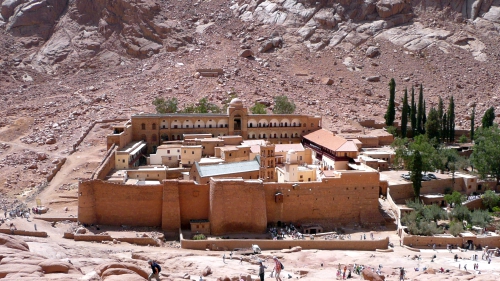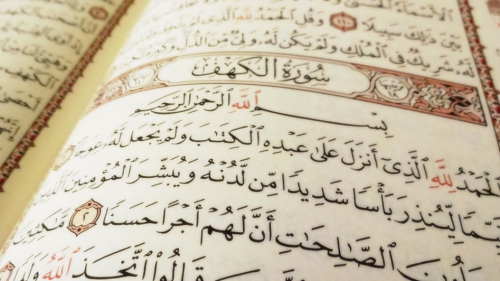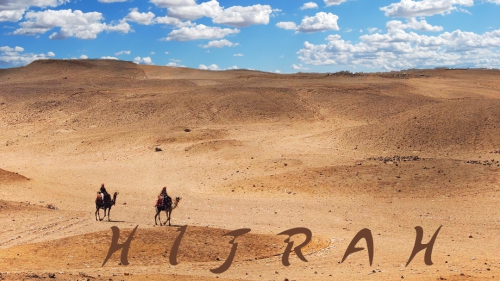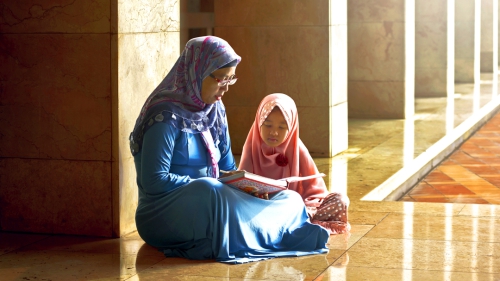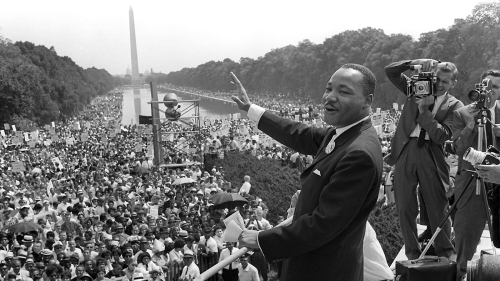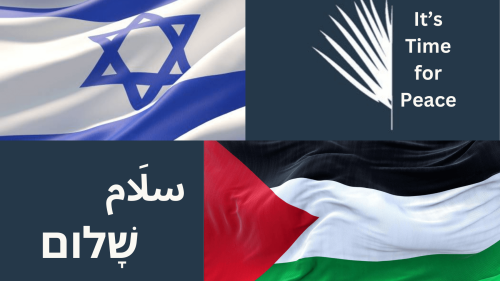Monotheists and the `Other` An Islamic perspective in an era of religious pluralism

- The Common Origin of all Children of Adam
- The Spiritual Essence of All Human Beings
- Observing the One God in Relations with Others
- Human Differences: The Inborn Ones
- Gender Differences
- Religious Differences
- The Use of Force
- The Acquired Differences
- The Environment
- The Bitter Reality
For monotheists the 'other' may be another monotheist who shares with them the same beliefs but belongs to a different ethnic group, physically, culturally or both, or may be another monotheist with partly different but still monotheistic beliefs. The 'other' may be a non-believer, a polytheist, an atheist or whatever else. People have inborn differences regarding which they have no choice, such as physical characteristics including the color or the language and inherited culture. Besides, there are acquired differences such as wealth and education. Religion stands in the middle between the 'inborn' and 'acquired' differences, since faith is supposed to be decided individually by a personal voluntary conviction, whereas in reality it is mostly inherited. Gender may also be seen as a considerable difference, even within the groups of monotheists who belong to the same ethnic group and share the same belief.
All monotheists believe in the 'One Lord' who has created the entire human race as well as all forms of life and the whole cosmos; and all of creation is under His control, "the Lord of all being." Monotheists ought to look upon the 'other' on the basis of their belief in the Supreme Lord, but they are mostly interlocked in what their physical senses catch, and their interests are often concerned with what is in this world, rather than with 'abstract' matters of faith. Besides, most people are inclined to keep their worldly relations and their relation to the One God in two strictly separate compartments, with no allowance for interaction. If our time is witnessing the barriers shrinking in geography, in time, in space, in the atom and between the concrete substance and energy, isn't it time for a whole-some wholeness of the human being as an essential prerequisite for a wholesome wholeness of humankind? And what can achieve such a whole-some wholeness of the human individual and the entire human race better than a genuine belief in the "one Lord Supreme of all being?"
1. The Common Origin of all Children of Adam
The Islamic perspective shares with the entire Abrahamic faith the idea that Adam and Eve represent the origin of all humanity. The Quran states that the children of Adam and his wife enjoy the physical, intellectual, expressive and psychological-spiritual gifts conferred by God on the human species in its totality to dignify the "homo sapiens" (Quran 17:70), in order to enable this human species to carry out the 'development' of themselves and of the earth in this world, with which they are entrusted by their Creator (Quran 11:61). All human beings are accountable for human and material development, for their own thoughts and actions, and for their relations with the 'other' and with the nature around them.
The diversity of humankind is enriched by the way in which individual and group specialties can complement each other through interaction and cooperation (Quran 49:13). The inborn differences represent an enriching variety which is an outstanding sign of God's all-mightiness, all-wisdom, all-providence and all-grace in His relations with His creation (Quran 30:22).
With regard to the common origin of humankind, the Quran stresses that Adam and Eve - and subsequently all men and women - are created from the same "living entity" (nafs wahida), so the first woman is created from the same "living entity" as the first man, and not from a certain part of the first man's body (Quran 4:1).1 - According to the Quran, both Adam and his wife shared the same responsibility in eating from the forbidden tree, and both repented to God and were granted forgiveness before carrying out their mission of "development" on earth (Quran 7:19-26). In this way, there are no grounds for any gender discrimination from the beginning of time, the creation of the first man and the first woman. Both are equally addressed in the Quran and both, men and women, are specified distinctively, one beside the other, in many verses, underlining the independent responsibility of each and their equality in this respect.2
2. The Spiritual Essence of All Human Beings
The Quran states that God has breathed into the first human being of His spirit (Quran 15:29; 38:72) and that every human being has been initially granted a spiritual compass to direct him/her to the Lord God: "And as your Lord brings forth their offspring for the loins of the children of Adam, and calls upon them to bear witness about themselves 'Am I not your Lord?,' they answer, 'Yes, indeed, we do bear witness thereto.' [Of this We remind you] lest you say on the Day of Resurrection, 'Verily, we were unaware of this,' or lest you say, 'Verily it was but our forefathers who - in times' gone by - associated others with God, and we were but their late offspring' " (Quran 7:172-173).3 It is the human responsibility to maintain one's spiritual fitness and development (Quran 91:7-10). The successive messages of God have been sent to let human beings make the best of the spiritual equipment that has always existed in every human being. Seen in this perspective, every human being is a "potential" believer, and being human has been inseparable from spirituality since creation. We have to remember this whenever we deal with any human being, whether such a human being maintains and makes use of this invaluable gift of God or not: for in any case, the divine spirit is in all children of Adam and his female mate, and this "common gift" provides common ground for mutual understanding and compassion. There is no place in monotheism for a monopoly of the truth and arrogance about it, since the truth by its nature is common among all and open to all.
Directing human beings towards their Creator, Lord and Cherisher, is meant to liberate everyone from being subjugated to any degrading power, going from powers within themselves, whims or inferiority and superiority complexes, to pressuring forces of the world around them and of persons who enjoy social, economic, political or any other sort of power over them. Such a unique liberation of the human being cannot be achieved by any philosophy or law, but only by faith in the one God. It simultaneously implants in the human mind and heart that, since the One Unique Supreme Lord is the only one who is incomparable ("there is nothing like Him; Quran 42:11; 112:4), all "others" are God's creatures and all human beings are equal in being created with the same potential by the One God. As monotheism establishes human freedom and equality in this way, we can understand how true and significant it is what Jesus said, "And you shall know the truth, and the truth shall make you free" (John 8.32). At an early stage of his life, Jesus went into the synagogue in Nazareth on the Sabbath and when he stood up to read the Scriptures, there was given to him the book of the prophet Isaiah, and when he opened the book, he found this passage: "The Spirit of the Lord is upon me, because He has anointed me to preach the gospel to the poor; He sent me to heal the brokenhearted, to preach deliverance to the captives, and recovering sight to the blind, to set at liberty them that are bruised" (Luke 4.16-18; see Isaiah 61.1).
Thus, belief in the One God liberates human beings from within the deepest depth. The liberation of the Israelites from Pharaoh's slavery was fundamentally achieved through the conceptual and spiritual-moral power of the liberating faith in the One God. The Quran indicates that God sent the Prophet to teach people what is right and what is wrong, and by so doing he "lifts from them their burdens and the shackles that were upon them" (Quran 7:157). Many Sufis have stated impressively that the deepest level of submission to God is the highest level of human freedom.
3. Observing the One God in Relations with Others
The belief in the One God, then, aims to benefit the human beings in their relations with "others", since God Himself is not affected in his all-mightiness by believing or disbelieving in Him. The Ten Commandments represent the cornerstone in the messages of monotheism and its moral goals. Next to the belief in the One God and the worship of Him alone, come the consequences that this faith has for all human relations, starting with the family and going to all human beings whose lives, families and properties should be secure from any violation (Exodus 20. 3-15). In the next two verses (Exodus 20. 16-17) dealing with neighbors is stressed as a starting point in dealing with "others."
That faith in the One God has immediate consequences for inter-human relations was emphasized by Jesus when he answered a question about the great commandment in the law: Jesus said, "You shall love the Lord, your God, with all your heart and your mind." And the second is like unto it: "You shall love your neighbor as yourself." On these two commandments hang all the law and the prophets (Matt. 23.35-40; see also Mark 12.28-32, Luke 10.25-28). When Jesus was asked further to define "the neighbor," he gave the well-known parable of "the good Samaritan" who offered help and compassion to the person who needed it, regardless of any difference in faith (Luke 10.29-37).
Now, in an era of globalization, the whole world has become a close neighborhood. The Quran teaches the doing of good to the neighbor from your people, the neighbor who is a stranger, and the friend by your side whoever he/she may be (Quran 4:36). Caring for travelers who lost their way or their possessions is repeatedly stressed in the Quran. Even in war. those who leave the enemies' front to seek the Muslims' protection, have to be granted this protection, in addition to a safe passage to the destination they choose (Quran 9:6). Prisoners of war, who have to be set free as soon as possible, and all prisoners, should be taken care of in their various needs: physical, intellectual and spiritual-moral (Quran 47:4).
Such a genuine understanding, sympathy and cooperation ought to be the outcome of the belief in the All-Merciful, who offers His limitless mercy and grace to all of His creation (Quran 21:107). Since the Lord and Cherisher of all human being "makes His sun to rise on the evil and on the good, and sends rain on the just and on the unjust," believers in Him ought to reflect God's mercy and grace in their relations with others: "For if you love them which love you, what reward have you? And if you salute your brethren only, what do you do more than others?" (Matt. 5.45-47).
The Quran endorses the moral commandments of the Torah (Quran 2:83), and describes the Torah as containing "guidance and light" (Quran 5:44), and as "clearly spelling out everything, and [thus providing] guidance and grace" (Quran 6:154). As for God's message revealed in the Gospel, the Quran states that in it "there is guidance and light, confirming the truth of the Torah that has preceded it, and [it was revealed] as a guidance and admonition unto the God-conscious" (Quran 5:46). The Quran urges the Jews to follow the Torah (Quran 5:43), as it urges the Christians to follow the Gospel (Quran 5:47), and has promised the good of this world's life if they do (Quran 5:66), in addition to the greatest reward of God in the life to come. As Jesus had emphasized in earlier times that he had not come to destroy the law of the Torah and the teaching of the prophets, but had come to fulfill them, so Muhammad emphasized that he was merely sent to fulfill what is virtuous. The Quran spells out what this implies: "True virtue and good do not consist in turning you faces towards the east or the west, but truly virtuous and good-doer is the one who believes in God, the Last Day, the angels, the books and the prophets; and spends his substance-however much he [/she] himself [/herself] may cherish it upon his near of kin, and the orphans, and the needy, and the wayfarer (who lost his/her way or possessions during a journey], and those who ask for help, and in freeing human beings from bondage, and keeps up the prayer, and renders the purifying [social welfare] dues (zakat); and [truly virtuous and good-doers are] those who keep their promises whenever they promise, and are pa-tient in misfortune and hardship and in time of peril; it is they that have proved themselves true, and it is they who are conscious of God" (Quran 2:177). Justice and kindness, al-adl wal-ihsan, concisely represent all virtues, as the Quran sometimes indicates (e.g. Quran 16:90). It is significant that early Muslims sought shelter from persecution in Abyssinia with its Christian just king, and were granted asylum there. Ibn Taymiyya, the prominent Muslim jurist (d. 1328), maintained that God lets the just unbelieving power persevere and flourish, while He does not let the unjust Muslim power persevere and flourish.4
4. Human Differences: The Inborn Ones
The inborn differences are, in Quranic perspective, a fascinating variety whose components complement one another, and all humanity should work together to reach a true awareness of their various ethnic and cultural characteristics and to secure a peace based on justice. Both are fundamental for developing a constructive moral cooperation through the whole world (Quran 5:2). Muslim traders, preachers and travelers reached Scandinavia, the Volga basin, Africa, beyond the Sahara, and South, Southeast and East Asia. Muslims' contributions to the fields of travel, geography and cartography were distinguished. The Muslim assistance, especially that of the Arab navigator Ibn Majid, was invaluable for the Christian Portuguese explorer Vasco da Gama (d. 1524) in his naval journey from Portugal to India around the Cape of Good Hope (1497-1499). Muslim scholars provided prominent works on all world religions known to them, not only the Abrahamic sister-religions. Al-Biruni (d. 1048) studied Sanskrit in order to acquire and provide accurate information about the religious beliefs of India in his outstanding work on that subject.
Muslim contributions to human civilization were never limited to Muslims or their non-Muslim partners in Muslim countries. They were always offered to any student, scholar or beneficiary in the fields of physics and optics, chemistry, astronomy and observatories, anatomy, medicine and surgery, art and architecture, irrigation, agriculture and gardening, as well as philosophy and social and human studies. Jews and Christians in medieval Europe were welcomed in their frequent visits to Muslim capitals especially in Muslim Spain, where they sought to benefit from what Muslim scholars had to offer in these various fields. Muslim works translated into Latin enlightened Europe and paved the way for its Renaissance, and thus they paid back the previous Muslims' debt to Europe, when the Greek heritage was translated into Arabic. A constructive and fruitful interaction involved the Muslim philosopher Ibn Rushd (Averroes, d. 1198) in debates with another outstanding Muslim thinker and scholar al-Ghazzali (d. 1111), with the Jewish rabbi and philosopher Maimonides (d. 1204), and with the Christian theologian Thomas Aquinas (d. 1274).
5. Gender Differences
Men and women have the same human rights and responsibilities - "in charge of one another," as the Quran states-according to each individual's endowments and not to gender. Both men and women have their moral, social and political obligations: "enjoin the doing of what is right and forbid the doing of what is wrong" (Quran 9:71). Human dignity is conferred by God on all human beings, whatever their inborn and acquired differences may be, as we have seen above (Quran 17:70). This dignity should be secured and sanctioned by law and guarded by the state authorities. However, the Quran always emphasizes that kindness, forgive-ness, generosity, and magnanimity ought to go beyond literal justice: "and to forgo what is due to you is, more in accord with God-consciousness, and forget not [that you are to act with] grace towards one another" (Quran 2: 237), and, as stated elsewhere in the Quran, "good and evil cannot be equal [so] repel you [evil] with what is better, then the one between whom and your-self was enmity [may then become] as if he [she] had [always] been a true close friend" (Quran 41:34). Unfortunately, as most Muslim peoples have be-come free from colonization, the call for "Islamic law" has been predominant, often at the expense of a deep concern for "Islamic morality."
6. Religious Differences
Religious freedom is an explicit Quranic principle: "No coercion should be [by any means allowed] in matters of faith" (Quran 2:256), and the sanctity of houses of worship-be they monasteries, churches, synagogues or mosques, "in all of which God's name is abundantly extolled" - should be secured and defended (Quran 22:40). Muslims and non-Muslims have equal rights and responsibilities according to the constitutional document drawn up by the Prophet Muhammad after his arrival in Medina. A dialogue between Muslims and non-Muslims ought to be conducted, objectively and ethically, in the best possible way, the Quran teaches (Quran 29:46). God alone can judge human beliefs and deeds according to every individual's intention, knowledge and abilities, and no human being has this kind of comprehensive knowledge of another person that is essential for such a judgment. This is a fact which the Quran repeatedly stresses.5
Of paramount significance are the words of Quran 5:48, "Unto each of you [those who are following any of the successive divine messages], we have appointed a law and a way of life: and if God had so willed, He could surely have made you all one single community, but [He willed it otherwise] in order to test you through what He has given you (of His guidance]. Vie, then, with one another in good deeds. Unto God you all must return, and then He will let you truly-know all that on which you were wont to differ."
With regard to the dialogue with those who share with the Muslims the Abrahamic faith, "the People of the Book," the Quran reminds Muslims of the common ground which should always be kept in mind: "And say, 'We believe in that which has been bestowed upon us, as well as that which has been bestowed upon you, and our God and your God is one and the same, and unto Him we submit ourselves' " (Quran 29:46), and, in the words of Quran 42:15, "And say: 'I believe in whatever [divine] book God has bestowed, and I am bidden to be just and fair with you. God is our Lord as well as He is your Lord, to us shall be accounted our deeds, and to you your deeds. Let there be no contention between us and you, God will bring us all together, for with Him is all journeys' end.' " Anyone who is involved in a dialogue ought to have an open mind and heart and to speak unboastfully, and the Quran gives this impressive example of language which sets the tone for any constructive discussion, assures the equality of all participants, and removes any mistrust or fear of prejudice: "And behold, either we or you are on the right path or have clearly gone astray. Say: 'Neither shall you be called to account for whatever we may have become guilty of, nor shall we be called to account for whatever you are doing.' Say: 'Our Lord will bring us all together (on the Day of Judgment], and then he will lay open the truth between us injustice, for He alone is the One who opens all truth, the All-knowing' " (Quran 34:24-26).
7. The Use of Force
Muslims are only allowed to fight against aggression, whatever the ethnicity, faith or opinion of the aggressors may be. Non-Muslims have to be fought against when they commit aggression, not because they are non-Muslims (Quran 2:190; 4:75; 22:39-40; 60:8-9). The Muslims also have to be fought against when they commit aggression (Quran 49:9). However, Muslims are taught by the Quran to strive for peace, even if there are doubts about others' sincerity: "And if they incline to peace, incline you to it as well, and place your trust in God... And should they seek but to deceive you [by pretending to want peace], behold, God is enough for you" (Quran 8:61-62). The Quran teaches that peaceful and friendly relations should al-ways be considered as a future possibility, even in times of inevitable confrontation: "It may well be that God will bring about [mutual] affection between you and those of whom you [now] face as enemies; and God is All-powerful, and God is Much-forgiving and Most-gracious" (Quran 60:7). It is historically significant that the early confrontation between Muslims and Jews in Arabia during the Prophet's time did not go beyond that time and place, and constructive relations between them existed in other countries under the caliphs, especially in Muslim Spain (Andalus). The Abbasid Caliph al-Mamun (813-833) offered the Byzantines - the constant neighboring enemy of the Muslim caliphate - a permanent peace and the payment of two thousand gold pieces in his message to Emperor Theophilus (829-842) if the latter agreed to allow a mathematician called Leo to come to Baghdad and teach there for some time, and this would be considered by the caliph as a gesture of goodwill. Unfortunately, the emperor did not respond positively to the caliph's message, and the hostilities continued.6 But the memories of these hostilities did not affect the relationship forever. The crusades were forgotten by many through the passing of time, and even colonization with all its aggression and injustice did not revive for everyone the memory of the crusades, and the two were not always correlated in the literature of the Muslims' struggle for independence.
8. The Acquired Differences
As the inborn human differences represent a wonder of God's creation and offer the potential of an enrichment of the human capability and productivity, so there is a very positive aspect also to the acquired differences that are, in Quranic perspective, natural and permanent, since a universal human consensus from all people in all times is impossible. Such diverse human views represent different angles of vision and various points of view with regard to a particular issue. And such an intellectual variety enriches the discussion of any matter, reduces the risk of human limitations and errors, and can lead to a better understanding of any point and consequently to the most responsible decision regarding related issues. This fact has been explicitly stated in the Quran: "And had your Lord so willed. He could surely have made all humankind one single community; but [He willed it otherwise, and so] they continue to have differences [all of them], save those upon whom your Lord has be-stowed His grace [as they follow His guidance in dealing with their differences); and for such a test [in handling constructively their differences and maintaining their good relations] He has created them all" (Quran 11:118-119). The Muslims are not immune from this natural law, their differences are also very human, and they have to tackle them objectively (Quran 4:59) and ethically.7 The argument with Muslims or non-Muslims should be pursued conceptually and behaviorally in the best way (Quran 16:125 and the earlier quoted verse Quran 29:46).
However, maintaining good relations with all "others" who have different views has to go hand in hand with the readiness to express one's own position openly and clearly. The expression of one's views about what is right and what is wrong is a right and an obligation which the Quran calls "enjoining the doing of what is right and good and forbidding the doing of what is wrong and evil," al-amr bil-marut wal-nahy an al-munkar. It is a right and responsibility of every human being, and those who follow the Abrahamic faith, Muslims and the People of the Book, should together seek to fulfill this duty (Quran 3:104. 114). A child should be brought up so as to initially discern and, when it becomes possible, to express himself/herself about what is right and what is wrong (Quran 31:17). Every human being is a witness in this life and should testify honestly about what he/she has witnessed, and this responsibility should be secured and protected (Quran 2:282-283). The right and obligation of peaceful association for legitimate purposes, occasionally or permanently, must also be secured for all, since freedom of expression is meaningless if it does not apply to individuals who are weak in facing social or political forces. Enjoining the doing of what is right and forbidding the doing of what is wrong may necessitate an organized collective effort, and therefore the Quran mostly uses the plural for the verb and its subjects, although the individual freedom of expression has always to be secured. Christian parades raising crosses and religious signs have been inseparable from se-curing the freedom of faith in the early history of Islam.
9. The Environment
Islam extends the duty of good behavior to include others in this universe than only human beings. People should maintain and develop natural resources such as earth, water and air, and they should secure life for all living creatures as long as they are not causing harm. Muslims should not cut trees or kill birds and other animals, even during war, except when necessary and when justified for other reasons. Pilgrimage is a religious training obligation to refrain from causing harm to human beings, animals and trees.
10. The Bitter Reality
The realities of our contemporary world are very far from, or even entirely opposite to, such lofty ideals, among believers and non-believers, among monotheists and non-monotheists, among Muslims and non-Muslims. Many monotheists, including many Muslims, who themselves adhere to certain way of thinking and a certain pattern of behavior, also believe that all good people have to fit in their frame. Tolerating differences in "others" has not become fundamental in our thinking nor in our faith, where dogma has overshadowed morality and behavior. Diversity within unity has not yet been recognized as being essential among Muslims and among all human beings. Horrible crimes are committed in the name of religion all over the world: in Northern Ireland, in Bosnia, in Algeria, in the Indian subcontinent and Sri Lanka and elsewhere. "Ethnic-cleansing" has become a familiar term in the political glossary, and ethnic conflicts cover the whole world; the ethnic mass massacres in Africa South of The Sahara are just one tragic example. Conflicts resulting from ethnic and religious differences, or born from chauvinistic nationalism and a fanatic following of ideologies, have been happening all through history, and Muslims and monotheists have not been an exception. Furthermore, modern technology and evil growth of terrorism and weapons of mass destruction have contributed to horrible practices aimed at destroying the "others," efforts that would bring with them a total self-destruction of the whole human race.
The "Universal Declaration of Human Rights" issued by the General Assembly of the United Nations in 1968, followed by other resolutions of later international conferences in Helsinki, Vienna and Beijing, represent some hope within the thick darkness of the present situation. But the Declaration requires significant organizational reforms and needs a fundamental moral base. Spiritual morality has to be spread through universal and national mass communications and education, and has to be nurtured by all our institutions. Monotheists have to stand together in developing a monotheistic morality among believers in the 'One God, and morality in general among all people everywhere. Monotheists, especially Muslims and Christians, are present all over the planet and have powerful institutions,- while many of them enjoy influential positions. The coordination of their concerted efforts would become a mighty power in safeguarding and reinforcing our era of an essentially pluralistic globalism. Detailed plans and practical applications can definitely be worked out in all circumstances, for the well-known saying always proves to be true: "When there is a will, there is a way."
There is the urgent call of the Gospel: "Come unto me, all you that labor and are heavy laden, and I will give you rest" (Matt. 11.28), "Glory to God in the highest, and on earth peace, and good will toward all human beings" (Luke 2.14). And the challenge of the Quran is equally clear: "O you who have attained to faith! Enter wholly into peace, and follow not Satan's footsteps" (Quran 2:208). We believe in God's promise: "And for those who strive hard in Our cause, We shall most certainly guide them onto paths that lead to Us, for God is indeed with the doers of good" (Quran 29:69).
Institute for the Study of Islam in the Contemporary World, Los Angeles. California .
Dr. Fathi Osman is a retired professor of Islamic Studies and has taught in several universities in Muslims World and the West. Among these universities are Al-Azhar University in Egypt, Houran University in Algeria, Ibn Saud University in Saudi Arabia, International Islamic University in Malaysia, Temple University, USC, and Georgetown University in America. He is also author of several books.
Notes:
- See the commentary of Muhammad Abduh and Rashid Rida on this verse in Tafsir al-Manar 4: 323 ff.; the same Quranic term is also found in Quran 6:98; 7: 189; 39:6.
- E.g. Quran 3:195; 9:71-72; 24:12; 30:21; 33:35-36, 58, 73: 47:19; 48:5: 49:11; 57:12; 60:12.
- In the renderings of Quranic verses throughout this paper use has been made of Muhammad Asad. The Message of the Quran (Gibraltar: Dar al-Andalus. 1980); in a number of cases the wording has been modified slightly and a few clarifications have been added in parentheses.
- Ibn Taymiyya. Tagl al-Din Ahmad. .if-Histis (Kuwait. 1983). 9, 91.
- E.g. Quran 2:113; 3:55: 16:124; 22:17, 69; 32:25: 39:3.46.
- A.A. Vasiliev, "Byzantium and Islam," in Byzantium,. ed. by N.H. Baynes and H. St. L.B. Moss (Oxford: Clarendon Press, 1948). An Arabic translation of this chapter has been added to Husayn Monis and Zayid's translation of Baynes' book The Byzantine Empire (1926), under the title al-Imbaraturiyya al-Bizantiyya (Cairo, n.d.), 380.
- Quran 16:125: 4:148; 23:3: 28:55: 41:34.36; 49:6. 9-12.
Related Suggestions
Adam Ibrahim Muhammad have majored on the minor. I ever thought that a Muslim could enlighten a fellow Muslim to journey on the path of peace and righteousness. But I wonder that the views of Dr. Fathi Osman, so moderate and conciliatory have also received firing. Opposition to soundness and sobriety are the proof that problems are the choice of men, of their own making, not divine.
Adam Ibrahim Muhammad considers the prophet to the Arabs and the contemporary Roman pontiffs to precede the sum total of the prophets and even the Messiah Himself! If he knew that he was only a prophet to the unbelievers and idolators corrupting true religion at that time, he would not trouble the believers in the name of the guide to right type of religion. Believers must base their belief on the Scriptures already with them. We already have the complete scriptures profitable for doctrine, for reproof, for correction, for instruction in righteousness and have no prophecy of another lone prophet/messenger after the appearance of the Mediator in the present dispensation.
Therefore we have no need to heed any private interpretation that comes by the will of ambitious men. The perfect way is with us at the end of time. After Y'Shua the Messiah, the anointed teacher is the Spirit of God among true believers in the Church. Nothing of man now, for everything is of God, by God and for God. We partake with Him by submitting to Him and His Supreme Will in true ISLAM (=ISA + ASLAM) where all are invited. There is only ONE ISA and therefore only ONE ISLAM for true believers. Mohammad could be one of the many believers, not a lone figure putting on the past and the future that might be imposed on the minds and consciences of people in the world. This will definitely invite resistance from the saintly and the sane. Shalom.
Let Allah help you with what you do.Please keep teaching us all.
Islamicity, You guys are doing a fantastic job and I love reading your articles wheter I agree or not.
This article was very well written and expressed veiws that are necessary for our time. thank you for sharing it.
This is an outstanding and excellent article.
I enjoyed it immensely. Amatullah Sharif
As Salaamu Alaikum
This is an outstanding and excellent article. I enjoyed it immensely.
Brothers & Sisters in Islam, Members.
This is, indeed, as many other articles, a brilliant one; putting emphises onto the PEACEFUL NATURE of Islam. Therefore those who read it should understand its purpose, which of course, is for the benefit of US (who adhere to Islam), and those who have different approach to life and its MEANINGS.
In today's world, the likeness of Dr. Fathi's voice needs to be heard; for a better promotion of "A WORLD PEACE". Islam is a GENTLE and RATIONAL way of life, that needs a "PEACEFUL ENVIRONMENT", to florish. Islam is a "vehicle" that runs on two wheels: a bycicle. These two wheels are our: HEART and MIND. The only difference to the real bycicle is that, the "wheels" are not in front and at the back, but run horizontally or parallele to the User, and that is very important. When TRYING TO BE A MUSLIM, one should use them accordingly and relatively to the subject matter of the daily transactions, so that the "SUBMISSION TO THE WILL OF ALLAH(swt)" can be SINCERE and PROFOUNDLY BALANCED.
O! Brothers and Sisters, lets us stop "judging" others in their short-comings. Let us be GRATEFUL to Allah (swt), for being GRACIOUS to us in GUIDING us onto the RIGHT PATH, and hopefully, HE will be MERCIFUL to us on the day of recogning.
The MESSAGE given to any prophet at any time, was based on "TWO THINGS"; TO ACKOWNLEDGE the ONE CREATOR and THE EMPLEMENTATION of SOCIAL JUSTICE. This has been the life of our beloved Nabi(Mohammed ibn abdoulah, pbh). If any one desires to fellow on his foot-steps should do just that, then and only then he/she can claim the status of Muslimhood.
A warning came to us against our heart desires. The mind and heart are the likeness of a "MATURE PERSON"(mind) and a "CHILD"(heart).
Wassalam
I agree in parts of the author's opinion on this subject. But I have some reservations on the contents especially in reagrds to the description of monotheism of other faiths.
Islam is no doubt a montheistic faith i.e the belief in one Supreme GOD. ( see Surah Al-Ikhlas ) But I can't say much for other faith, some claim to belief in one God but there are some which are not monotheistic at all. For instance the trinity of the Christian belief is not monotheistic at all. Now if our approach is to simply compare the moral aspects of faith and religion, of couse we will find various similiarities. And of couse in reagrds to history I have to commend the author for his detailed analysis and studies on the times when Muslims ruled with fairness and also once had to seek protection from a just Christian King.
But the belief of the Oneness of One GOD in Islam transcends all that, it's not just a matter of making a comparative study but the integral aspect is the Tauhid Ulluhiyah. In fact there are several chapters and verses of the Quran in which GOD has reminded the believers of the falsehood of ascribing partners to HIM and how other holy scriptures had been falsified by those who went astray. Therefore while there is absolutely nothing wrong in promoting the goodwill of Islam to other believers of other religion, but a cautious approach is needed here. The message of the truth must be uphold, and that the resaon why Muslims were oppressed in today's world is not just economics, political but it is also because of the faith that they hold close to their hearts. There are several chapters and verses of the Quran to support this. And along with the traditions and sayings ( hadith ) of the Prophet Muhamad Rasullullah ( peace be upon him ). Are we to ignore all this ? Wassalamualaikum wrbt.
In the translation of Quran 2:177, the Dr. should have seen the ingenuity of Allah usin the phrase "the prophets" meaning that people should believe in all the prophets right from Adam to the last Muhammad (Sallal-lahu 'alaihi Wasallam (SAW)). Ask any of the jew or the christian does he/she believe in the last prophet Muhammad (SAW)? The answer of course is in the negetive, so why insists a muslim (who believe in all the prophets without descrimination) be equal with those that not only disbelieve but can go to any length to tarnished the image of the beloved messenger? (As we see in the cartoon controversy).
While i don't belive in violent revolutions to bring about change in the system, the way of the prophet (SAW) and the sahabas endorsed strongly the use of other forms of jihad, to preached and institutionalised Islamic shari'a as the only way of life. And we are asked to follow the foot steps of the prophet in all his life activities which is basically the establishment of Islamic ideals.
Yes we have to live with the non believers respecting their rights and vice versa. But this should be under the rule of Lakum dinikum waliya deen-unto you is your religion and for me is mine (Q 109:6).
The Dr. translates Q 2:108
"O you who have attained to faith! Enter wholly into peace, and follow not Satan's footsteps"
With respect to the Dr.'s intellect the correct and if u will agree with me most sensible and popular translation has always been:
"O you who have attained to faith! Enter wholly into Islam, and follow not Satan's footsteps" Meaning literally enter Islam compeletely and do not pick on those issues (to be contd)
dear Dr. Osman, thank you for your article!
After the death of Muhammad s.a.w, there won't be any more Prophets sent. So, the burden of the work of dakwah ilallah lies on the shoulders of all Muhammad's followers.
When all the Sahabah's did dakwah ilallah, 2/3 of the world came to Islam ( acknowledged the presence and powers of Allah s.w.t and adhering to all His commands) within a short 23 years. The world was in peace and harmony becasue everyone was deemed equal under one Law i.e the Law of the Creator.
The problem today is Muslims didn't do dakwah iallah and is trying to please the kafirins. For what? There was and still is, only one religion, Islam. Who sent Noh a.s? Who sent Musa a.s? Who sent Ibrahim a.s? Is Allah trying to sent 124000 religions? What was Noah's religion? What was Moses religion? What was Ibrahim's religion?
The line between the Muslims and Musyriqs (non-Muslims) have been drawn and demarcated clearly by Allah s.w.t and relayed to all Muslims 1400 years ago. The Surah is al-Kafirun. Muslims are not supposed to submit to what the Musriqs (non-Muslims)submitted. We, Muslims are the slaves of Allah s.w.t. They ( the Musriqins)has yet to be given the light to "see with their hearts", submit to Allah and are still slaves to desire and lust. Prophets were rejected and even murdered before us. So, waste no time explaining to these Musriqins.
In the Quran,Allah s.w.t did mentioned: It is the same, whether you remind them or not, they will not believe.
Lines have been drawn. Muslims have a job: Invite all towards Allah s.w.t. Whether the Musriqins (non-Muslims) accepts or not is not the Muslim's job. The Hidayat ( or light, guidance) is at the sole discretion of Allah s.w.t. Allah s.w.t is the Creator of all, yes the Muslims and non-Muslims.
Thank you
Mohd Haneef Yusoff
Malaysia
I would like to inform the author that I agree with the origins of Adam in ayah 4:1 but you forgot that there is another ayah that simply states:
And among His Signs is this, that He created you (adam) from dust, and then [Eve from adam's rib, and then his offspring from the semen, and], - behold you are human beings scattered! (30:20)
So my dear respected brother in your article you put a statement that contradicts this ayah and which is also supported by the sunnah of the prophet (S.A.W). I pray to Allah that he rewards your work and intentions and that you be careful to give the right message to muslims and nonmuslims alike. Please forgive me for anything I said to upset or hurt you.
Jazakullah bi khair
Daniel
JUST STOP AND THINK






